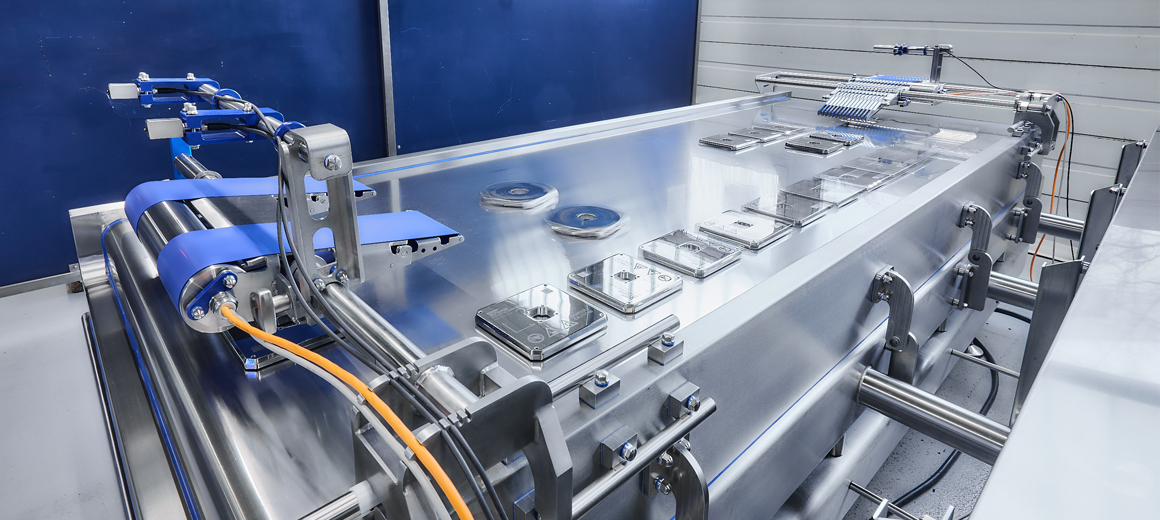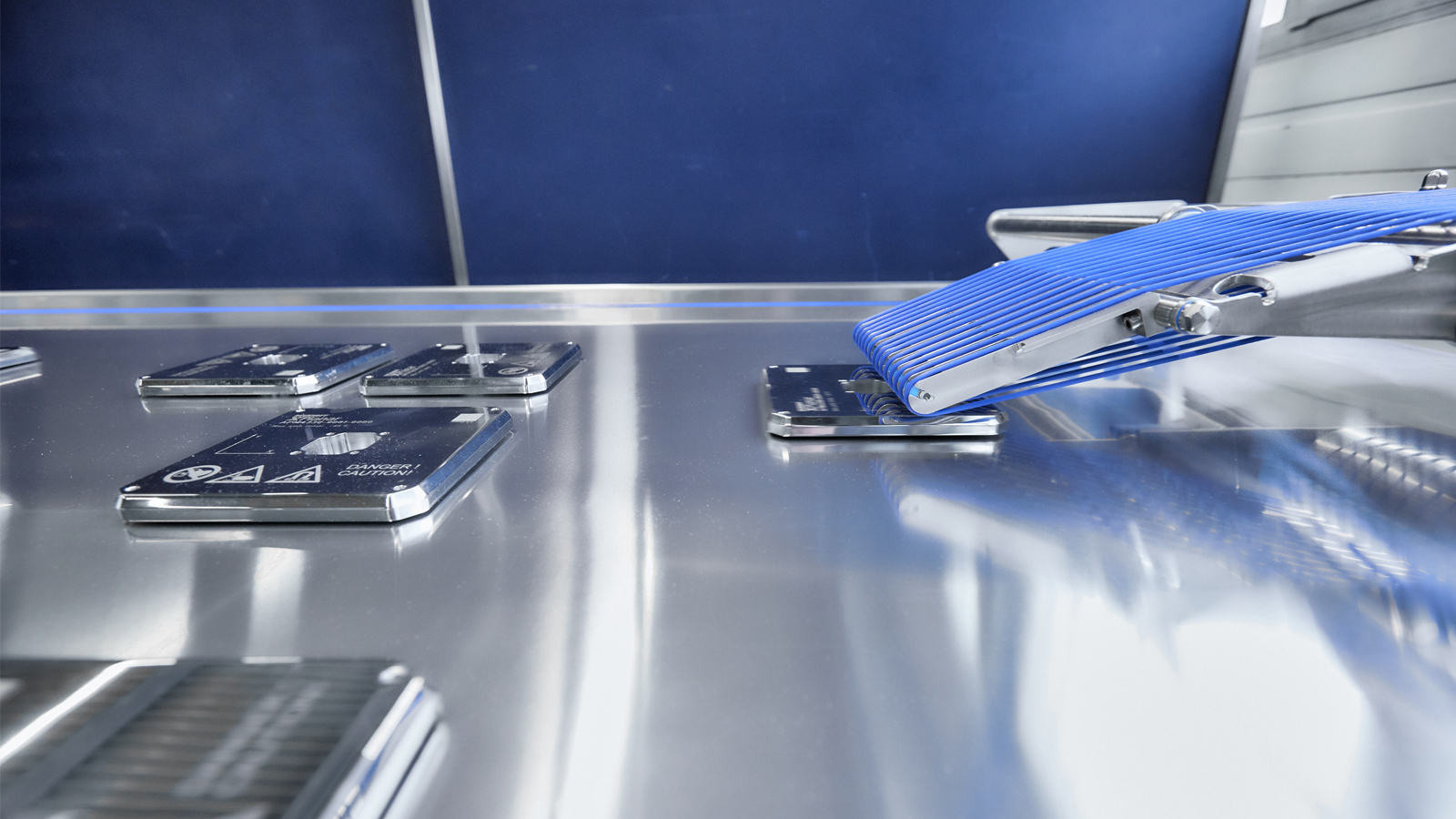

XPlanar in a hygienic design used in a handling system for sliced foods
Provisur Technologies GmbH in Flawil, Switzerland, has developed an extremely compact, flexible, and hygienic handling system for sliced foods such as cheese, salami, and bacon. At the heart of the machine is the Beckhoff XPlanar planar motor system with its stainless-steel housing, which not only significantly reduces the machine footprint, but also significantly improves system performance, flexibility, and cleanability with incredibly flexible floating product transport.
Headquartered in Chicago, USA, Provisur Technologies has established a strong reputation for the development of innovative industrial food machinery as well as integrated production systems for processing a wide variety of food products. The same also applies to the Swiss subsidiary in Flawil, which is active in the pressing and slicing sectors with its Hoegger and Formax brands, among others, and has developed a new handling system for use in conjunction with the tried-and-tested Hoegger presses and Formax slicers. This Free Movement System (FMS) is designed to be more compact, flexible, and hygienic, revolutionizing product handling between the slicer and the packaging line, according to the Swiss experts at Provisur.

Maximum system performance in minimum space
According to Gerd Stratenwerth, Sales Manager Slicing at Provisur, the Formax FMS significantly reduces the space required compared to conventional systems. At the heart of the system is a handling and buffering system built from 48 XPlanar tiles and a flexible number of XPlanar movers. Through its modularity, XPlanar optimally supports the FMS concept as an individually adaptable standard machine. With the control technology placed underneath the stainless-steel worktop to save space and maximize functional reliability, the result is a particularly compact design – especially since the additional modules otherwise required, such as the turning station, buffer, inliner, and overlapper, are no longer required. The core task of the FMS is to buffer products for the downstream packaging machine to ensure a continuous supply during the slicer’s loading pause. In conventional lines, this task is solved with belt systems, which require more space and cleaning effort. The FMS can also be used to perform tasks such as turning portions or else merging or distributing product streams.
Explaining the advantages for the end user, Gerd Stratenwerth notes, “Thanks to the fast, free-floating movers, the portions can be processed with a high output for this typical application segment. Even multi-type portions can be put together flexibly and in the smallest possible space. Because the XPlanar movers can move to any point on the work surface and rotate freely, the whole process of picking up cut products for transport is more straightforward than ever. This also means that the transported food always arrives at the packaging station in the optimal orientation. The entire process is characterized by an enormous amount of flexibility, because handling a new article or a different packaging variant does not require a changed system design, just an adjustment in the software program.”
Stainless-steel design for optimum hygienic properties
The FMS offers excellent hygienic properties due to the stainless-steel housing of the XPlanar tiles and the use of stainless-steel XPlanar movers. The sliced products are transferred directly from the slicer to one of the movers, whether in shingles, stacks, folded slices, or multi-variety or overlapping portions, depending on the specifications. Once the products have been transferred to the packaging line, the movers can be cleaned and sterilized by an optional cleaning station during operation, generally on the return trip to the slicer. In addition, according to Fatih Yaman, automation engineer at Provisur, the floating and non-contact transport avoids any kind of abrasion: “Not only does this offer direct protection for the food against contamination, but it also noticeably simplifies the level of cleaning compared to the often more convoluted assembly work associated with conventional systems. This is becoming an increasingly important consideration, not least in light of the current staffing issues currently affecting food processing companies.”

Gerd Stratenwerth adds, “The FMS eliminates the need to touch the product and thus the human factor as a source of contamination. This also has a positive effect on product shelf life.” Another important aspect is the increased plant availability. Due to the lower number of mechanical components – for example, as a result of the conveyor belt structures being reduced by around 90%, the time required for cleaning is reduced to roughly 10 min and the associated maintenance effort is also lower.
Software functionality replaces mechanics
The flexibility of XPlanar does not simply stop with the customization of the FMS either, as Fatih Yaman makes clear: “The system is also completely open in terms of packaging type. Thermoforming machines, for example, usually operate on multiple lanes, while form-fill-seal machines tend to operate on a single lane. This can be responded to flexibly and quite easily via a corresponding requirements profile in the software,which is particularly useful since changes to customer orders can happen over and over again in the world of food packaging. In conventional scenarios, the complex handling area between the slicer and the packaging machine would have to be replaced and mechanically adapted each time. The same applies to the product handling itself, which allows faster and safer manipulations than the mostly manual activity associated with conventional applications. In the case of multi-variety portions, for example, the different cutting directions sometimes required can be taken into account simply by turning the mover.”
Replacing mechanics with the software functionality of the XPlanar has even more decisive practical advantages for Fatih Yaman, “Wear is a crucial issue that crops up time and again in our discussions with customers. This is because a conventional handling system consists of a very large number of mechanical components, such as conveyor belts, and is accordingly subject to a high level of wear. What’s more, the level of cleaning effort is significantly higher, but also indispensable due to the constant contact with the food. Then there’s the fact that there are always numerous transitions between the individual belts in systems like this, and each of them can change the position of a food portion, which in turn can lead to complications during subsequent insertion into the packaging. Generally speaking, a mechanical system is much more susceptible to a decline in positioning accuracy. But with XPlanar, all of these aspects are eliminated.”

Easy implementation in line with Industrie 4.0 concepts
The fact that the software partially solves tasks previously solved mechanically, does not mean that the effort required for implementation is increased on the software side. Instead, with the TwinCAT 3 XPlanar Function (TF5890), systems can be easily commissioned or new configurations created via an XPlanar configurator that is seamlessly integrated into the familiar engineering environment. As Fatih Yaman explains, “With the functions of the default library, the XPlanar system can be handled in the same way as conventional drive technology with a corresponding number of axes. The complete control of the entire system via the central TwinCAT controller also enables perfect synchronization between the movers and the infeed and outfeed conveyors.”
With their inherent system openness, TwinCAT and PC-based control are also proving advantageous with regard to the increasingly important topic of Industrie 4.0, as Gerd Stratenwerth adds, “The connection of our machines to higher-level control systems at our customers’s sites is becoming immensely important. However, since these vary greatly depending on the customer, we need open control technology if we want to be able to work with as many different platforms as possible. And for this, the PC-based solution is much better suited than our previous conventional control technology.”